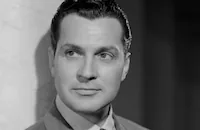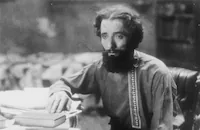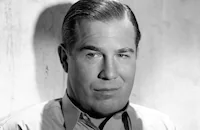I'm No Angel

Brief Synopsis
Cast & Crew
Wesley Ruggles
Mae West
Cary Grant
Gregory Ratoff
Edward Arnold
Ralf Harolde
Film Details
Technical Specs

Synopsis
Tira works as a dancer and occasional lion tamer for a circus, but her greatest pleasure in life is in her liaisons with wealthy men. During one of her dances, she makes eye contact with a gentleman wearing a huge diamond ring. He later joins her in her hotel room for a nightcap but is interrupted by the sudden arrival of Slick Wiley, a pickpocket who thinks of himself as Tira's "man." Slick knocks the gentleman unconscious and steals his ring but later is arrested and thrown in jail. The circus owner offers to lend Tira money for a lawyer to avoid prosecution on condition that she put her head in a lion's mouth as part of a new act to tour major cities. Tira agrees and becomes the star attraction, gaining fame and wealth from her success. Various society patrons visit Tira backstage, among them Kirk Lawrence and his fiancée Alicia Hatton. Alicia is disdainful of Tira, but Kirk becomes infatuated with her, and a whirlwind romance ensues, with Kirk lavishing expensive gifts on Tira. Kirk's friend and associate Jack Barton calls on Tira to ask her to give up her relationship with Kirk on Alicia's behalf. Tira agrees and she and Jack fall seriously in love. One night after his release from jail, Slick enters Tira's penthouse and pretends to be her lover when Jack arrives. Jack calls off his engagement to Tira, who, unaware of Slick's ruse, sues Jack for breach of contract. Tira represents herself in court and proves to all concerned that she is a respectable woman and deserves substantial payment for damages. Realizing he was set-up, Jack agrees to the settlement. Later he and Tira reaffirm their love for each other.

Director

Wesley Ruggles
Cast

Mae West

Cary Grant

Gregory Ratoff

Edward Arnold

Ralf Harolde

Kent Taylor
Gertrude Michael

Russell Hopton

Dorothy Peterson
Wm. B. Davidson
Gertrude Howard
Libby Taylor

Nigel De Brulier

Irving Pichel
George Bruggeman

Nat Pendleton
Morrie Cohan

Walter Walker
Crew
Lowell Brentano
Harvey Brooks
F. E. Dine
Hans Dreier
Gladys Dubois
Ben Ellison
Bernard Herzbrun
William Lebaron
Otho Lovering
Harlan Thompson
Leo Tover
Mae West
Phil G. Wisdom

Photo Collections
Videos
Movie Clip


Trailer
Hosted Intro
Film Details
Technical Specs

Articles
I'm No Angel
Mae West often said in interviews that she discovered Cary Grant but the latter was always quick to correct that statement since She Done Him Wrong was his eighth Paramount film and not his movie debut. Nevertheless, Grant felt that West was a unique and powerful personality but, off the record, he was more critical of the buxom star: "She always got a great deal of publicity for herself. She was intent upon what she wanted to do and did it. Everyone else suffered the consequences - I could never understand the woman. I thought she was brilliant with that one character she portrayed, but she was an absolute fake as a person."
Typical of a Mae West film, I'm No Angel features smart, snappy dialogue and loads of double entendres. It was West's second original writing effort; she is credited with both the story and the dialogue. Her first original work was the play Diamond Lil, upon which She Done Him Wrong was based. To this day, West is known for her one liners, wisecracks, and blatant sexuality in an era that was not exactly receptive to that type of behavior on the stage and screen. In fact, West was arrested in 1926 for writing a play simply called Sex. The trial which followed that arrest is probably what inspired West to include a courtroom scene in I'm No Angel in which she takes over and cross-examines the witnesses, something she probably wished she could have done in her own situation.
One interesting cultural note is that I'm No Angel was one of the few early Hollywood films that characterized African-American actors in a positive light. Major studio films of this period, and even after I'm No Angel, often used white actors to portray black characters but one this time. And while the black women in the film are still playing maids, West bonds with them in a scene that was relatively unheard of at that time. It's no secret that Mae West loved to break boundaries wherever she could, and whether she played a woman exerting power over men, wore revealing clothing, or used race to get a point across, her films are still remarkably entertaining and prove she was a true original.
Director: Wesley Ruggles
Producer: William LeBaron
Screenwriting: Harlan Thompson and Mae West
Cinematography: Leo Tover
Editing: Otho Lovering
Art Direction: Hans Dreier
Music: Harvey Brooks
Cast: Mae West (Tira), Cary Grant (Jack Clayton), Gregory Ratoff (Benny Pinkowitz), Edward Arnold (Big Bill Barton), Ralf Harolde (Slick Wiley).
BW-88M.
by Sarah Reiman

I'm No Angel
Quotes
Beulah, peel me a grape.- Tira
When I'm good, I'm very good. But, when I'm bad, I'm better.- Tira
It's not the men in your life that counts, it's the life in your men.- Tira
Were you at the haircutter or have your ears moved down?- Tira
What do you do for a living?- Tira
I'm a politician.- Rich Guy
I don't like to work either.- Tira
Trivia
When Rajah the Fortune Teller gives Tira (Mae West) her horoscope, he gives her birthday as August 17, which is West's actual birthday.
Considerable problems arose with the censors, mostly about the suggestive lines in some of the songs. The song "Nobody Loves Me Like a Dallas Man" was originally "Nobody Does It Like a Dallas Man". After the songs were toned down, the Hays office approved the film, and it was passed by the National Board of Review.
In 1935 and 1949, the production code was more rigorously enforced, and the film was not approved for re-release.
Notes
Paramount story files at the AMPAS Library reveal that Mae West authored the original treatment of the film. According to a pre-release news item in Hollywood Reporter, Claude Binyon and Frank Butler were assigned to write the screenplay. Their contribution to the final film is undetermined. Correspondence in the MPAA/PCA Collection at the AMPAS Library indicates that a script was submitted to the AMPP in June 1933, and in an interoffice memo to Will H. Hays, president of the MPPDA, from Dr. James C. Wingate, Director of Studio Relations of the AMPP, Wingate notes that the script contained no "particularly objectionable sex scenes" and "seemed to present no fundamental problem," although several songs and specific lines merited special attention. The song "No One Does It Like That Dallas Man" was rejected, and the AMPP suggested that the words "does it" be changed to "loves me." Specific lines of the song such as, "with a special whip" and "he can ride," were considered offensive, as was the entire fourth stanza of the song "They Call Me Sister Honky Tonk." The line "Baby I can arm you with this love of mine" in the song "I'm No Angel" was deemed "overly suggestive," as was the line, "It takes a good man to make me" in the song "Goin' to Town." In a July 1933 letter to Paramount, Wingate noted further objections to the second white script. Two lines spoken by the Barker, "She'd give the old biological urge to a Civil War veteran" and "The girl that makes your dreams come true" were deemed unacceptable. Further suggested changes included "Delete the world 'French' from the line, 'A set of French postcards'...makes the whole subject too suggestive. The following lines 'You'll like what I've got in mind,' 'I'm always wonderful at night,' and 'but when I'm bad I'm better' should be deleted." On the basis of another suggestion, the song "Take Me" was retitled "I Want You, I Need You."
In September 1933, the AMPP viewed the film and was "happy to notice the care with which the picture had been treated from the standpoint both of the Code, and of censorship." Although there were several items that the AMPP felt might be questioned by censor boards, the film was considered acceptable, and in a letter from Dr. Wingate to Will Hays, Wingate noted that "though it contained the expected number of wise-cracks and Mae Westisms, we believe it will meet with no real difficulty." A letter dated October 1933 notes that "the songs have been toned down, and while many of the gags border on questionable dialogue, the fadeouts are so arranged, that most of the suggestions are left to the imagination...and I am sure, her line, 'How am I doin!' and 'When I'm good I'm good, but when I am bad I'm better,' will become as famous, as the 'C'm up some time'[sic]." In October 1935 the film was reevaluated by the AMPP, and in a letter to Paramount, Joseph I. Breen, director of the PCA, noted that he considered the picture "so thoroughly in violation of the Production Code that we desire to recommend, again, as in the case of the picture She Done Him Wrong (see below), that [Paramount] withdraw [their] application for the approval of this picture by the Production Code Administration." In an interoffice memo from Breen to Hays, Breen notes that the AMPP reviewed both She Done Him Wrong and I'm No Angel and, finding them in violation of the Production Code, deemed it "utterly impossible" for them to issue a certificate of approval. Breen further commented that "with regard to I'm No Angel, note please that this is one of the pictures which was placed in Class 2 at the time we were discussing the advisability of withdrawing certain pictures which were believed to be offensive....Class 2...according to our understanding, means that the contracts for the sale of the picture, were to be concluded, and that the picture was then to be withdrawn...the pictures were to be re-submitted 'and successful effort' made to 'cause them to be entirely unobjectionable under the Production Code' and 'if this be not possible, then the pictures are to be entirely withdrawn.' It is our judgment that no successful effort can be made to cause them to be entirely unobjectionable under the Production Code."
In 1949 the film was evaluated again, and Breen noted in a letter that if they made "some judicious cuts in the film, [it] would bring it within the strictly technical provisions of the Code....No good will accrue to the industry among right-thinking people with a release of a Mae West picture. On the contrary, it would appear to me that we would expose ourselves to the charge that we were 'letting down the bars;' that we were again making 'filthy pictures' as was the charge levelled against the industry, from a thousand sources, back in 1933-34." I'm No Angel was one of the top money-making films of 1933. Hollywood Reporter news items note that Laura Treadwell was slated to appear in the film. According to a modern source, it had a gross earning of $2,250,000 on the North American continent, with over a million more earned internationally.

Miscellaneous Notes
Released in United States 1933
Released in United States 1982
Released in United States 1996
Released in United States 1999
Shown at London Lesbian & Gay Film Festival as part of program "The Queen of Camp: A Mae West Retrospective" March 21 - April 4, 1996.
Released in United States 1933
Released in United States 1999 (Shown in New York City (Film Forum) as part of program "The Joy of Pre-Code: Sex, Booze and Red Hot Jazz, 1930-1933" August 20 - September 14, 1999.)
Released in United States 1996 (Shown at London Lesbian & Gay Film Festival as part of program "The Queen of Camp: A Mae West Retrospective" March 21 - April 4, 1996.)
Released in United States 1982 (Shown at FILMEX: Los Angeles International Film Exposition ("Marathon of Mirth": Comedy Marathon) March 16 - April 1, 1982.)















